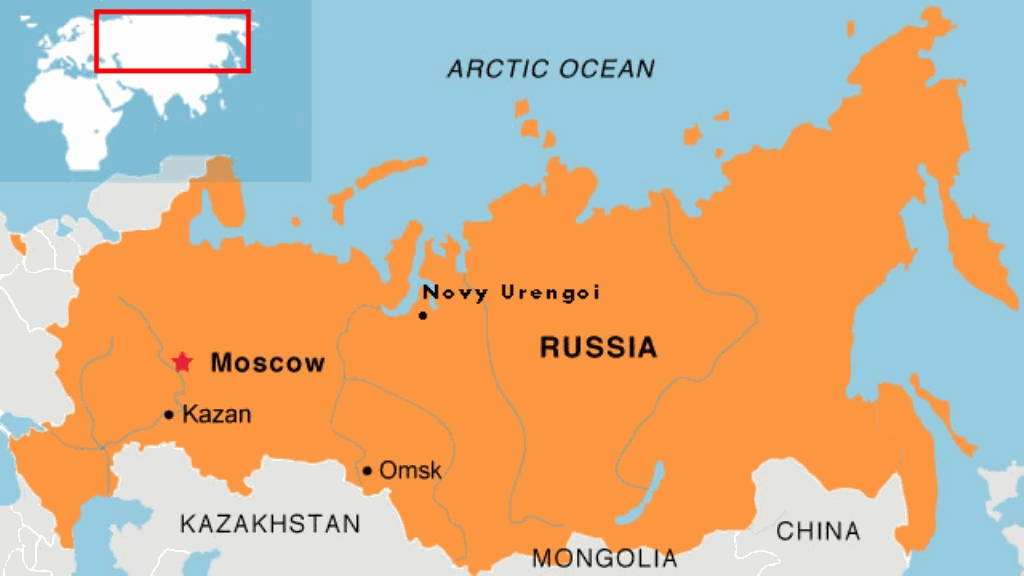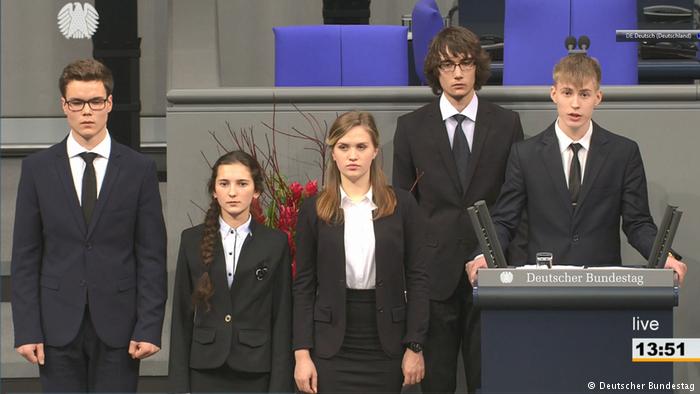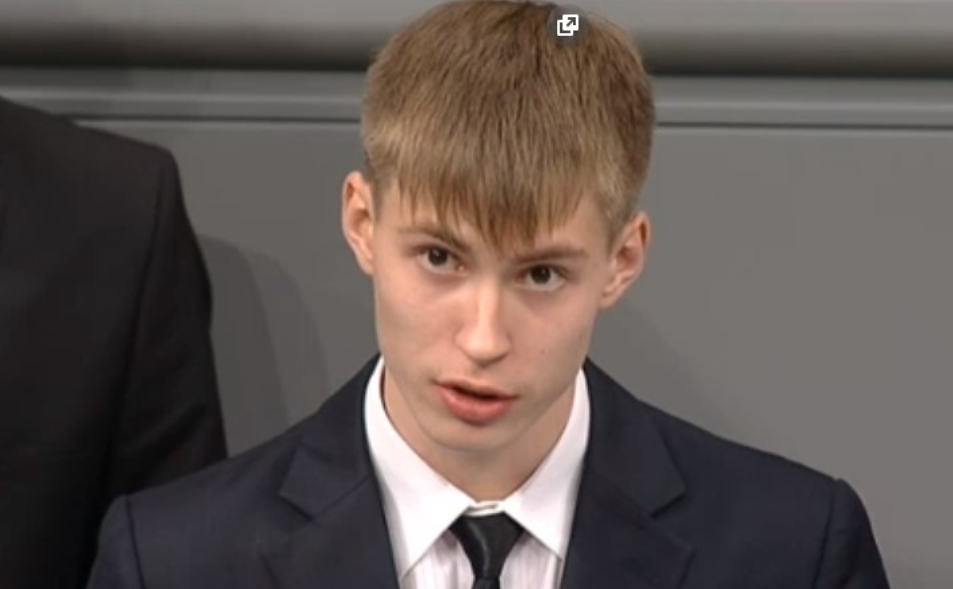A heated, somewhat scandalous debate has been going on for several weeks in Russian media. Almost all well known politicians, members of the Russian parliament, and even president Putin himself are participating in the debate. The subject is a two-and-a-half minute speech of a 16-year-old boy from a small city of Novy Urengoi, located in the far north of Siberia.
The cause of the controversy was the fact that the boy, Nikolai Desyatnichenko, was speaking in the German parliament, the Bundestag, and expressed compassion for German prisoners of the World War II.
How a Siberian teenager get to address the German parliament?
Novy Urengoy is unofficially regarded as Russia’s “gas capital.” Russian energy giant Gazprom sponsors the Nikolai’s high school, while a Gazprom partner Wintershall Holding, a German crude oil and natural gas producer, sponsors the German student exchange project at the partner school in Kassel.
Nikolai and five other students — three from Germany, three from Russia were sent to present a joint project the schools in Kassel and Novy Urengoy had prepared — a study on the fates of military prisoners on both sides of World War II. They were speaking in front of German President Frank-Walter Steinmeier and many German cabinet ministers, at an event commemorating the National Day of Mourning.
Here is the excerpt from the Nikolai’s speech:
“I learned and thoroughly studied the biography of Georg Johan Rau.
He was born on January 17, 1922 to a large family. Georg went to front with the rank of corporal and fought as an air defense soldier in the Battle of Stalingrad in 1942-1943. Georg was one of the 250,000 German soldiers who were surrounded by the Soviet Army in the so-called “Stalingrad Kettle”. After the cessation of fighting, he was sent to a prisoner of war camp. Only 6 thousand of these prisoners returned home alive. Georg didn’t.”
Nikolai said that the fate of the German soldier touched him. He explained how he’d visited a German military cemetery and was ‘very sad’ when he saw the graves of the people, many of whom probably were innocent. They were sent to fight but in reality they had wanted to live peacefully, and not wage war.’”
He finished his short speech with the words:
“Otto von Bismarck said: ‘Anyone who looks into the glassy eyes of a soldier dying on the battlefield will think well before starting a war.’ I sincerely hope that common sense will prevail on the whole Earth and the world will never see wars again.”
Nikolai Desyatnichenko
A Russian living in Germany published a live recording of the student’s remarks, triggering an avalanche of indignation in Russia.
Some people were accusing Desyatnichenko of treason. The main allegation was that Desyatnichenko sympathized with the German soldier whose army had begun a war of aggression.
The fact that Russia this month is commemorating the 75th anniversary of the Soviet counteroffensive in Stalingrad seemed to fuel emotions even more. Patriotism and World War II, which in Russia called the Great Patriotic War, are closely linked in Russia.
Lawmakers in the Russian parliament asked prosecutors to examine whether this was a case of belittling Nazi crimes. The Novy Urengoy city administration called for an investigation at the boy’s high school.
The boy’s mother published a letter of explanation in the Russian media, implying the speech was shortened by time constraints. Initially, she wrote, her son wanted to speak about his war veteran great-grandfather. In any case, she added, his main message was a desire for peace in the world.
A lot of Russians shared the indignation against the Siberian boy.
Here is a typical FaceBook post, published by the first wife of my cousin, a Russian woman who now lives in Germany:
“I learned from the Russian Internet about a schoolboy from Novy Urengoi, who spoke in the Bundestag with words of compassion for ‘innocent victims’ – Wehrmacht soldiers.
“Not only the approval of this action by Gazprom, which is also reported by the Russian media, is outrageous, but especially outrageous is the fact that it is possible to pronounce such words in the parliament of the FRG, right now, these days.
“Especially valuable for our enemies is the fact that these words are coming from the lips of a Russian schoolchild. Who is the author of this project? Which German non-governmental organization organized and financed this act, which is aimed at discrediting Russia and the role of the USSR in defeating fascism?”
Finally, when it seemed the debate was spinning out of hand, the Kremlin stepped in.
“We believe it is wrong to accuse Desyatnichenko of evil intentions or Nazi propaganda,” said President Vladimir Putin’s press spokesman, Dmitry Peskov.
Anna Kuznetsova, Putin’s commissioner for human rights, also backed the young student, arguing that “agitation and debasement” don’t further patriotism.
Even Putin himself told a story about his mother feeling sorry for German prisoners of war.
Amazingly, the Kremlin’s involvement didn’t stop the activity of the most enraged “patriots”. Several days ago there were published reports about new legal actions against Nikolai’s teachers.
This “patriotic” rave triggers concerns of the democratic oriented part of Russians.
Vladimir Pozner, one of the most prominent Russian TV journalists, wrote in his blog:
“You know, what I thought, reading the avalanche of these abominations, which poured on the head of this boy, his parents, his teachers, his school? I thought that our society is seriously sick, in many ways it lost human landmarks, it is unable to distinguish between white and black, nobility from meanness.
“It needed the press secretary of the president of the country to make a statement, conveying the president’s words, just to quiet down all this abomination, though not stopping it.
“I’m glad that such a boy as Nikolai Desyatnichenko exists. He and others like him inspire me with optimism.”
Arcady Babchenko, one of the best known opposition Russian journalists, wrote:
“This country cripples its children. It crippled them sixty years ago, and it keeps doing it now. First of all it cripples those children who do not fit into the new paradigm, who rise above a bottle of beer: the smartest, the purest, the brightest.
“The harassment of a child is one of the most perverted pathologies, to which human nature can reach. Nature had reached it. Evacuate your children from Mordor, my brothers. Do not allow to cripple them. It’s your duty.”




